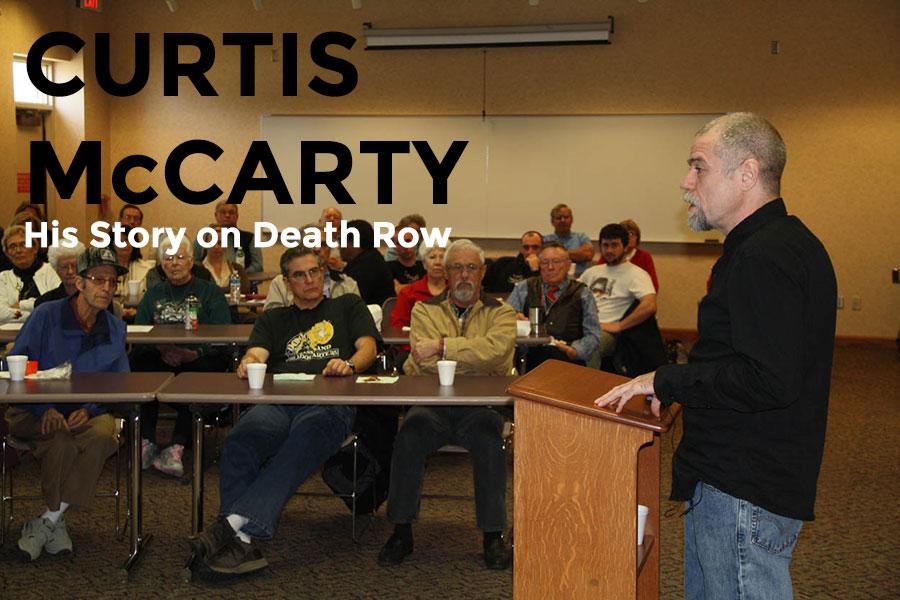Curtis McCarty – His Story on Death Row
Curtis McCarty spent over twenty years in prison for a crime he didn’t commit. Tainted evidence and a failed judicial system landed McCarty on death row. Knowing he was innocent all along, McCarty held on to a sliver of hope that he would once again see the light of day and relish in the freedom that had stolen from him. After two decades of his life spent in an Oklahoma prison, McCarty’s got his chance for freedom, and since then, he has taken his story all across the world, hoping to inspire and advocate his message of repealing the death penalty. Recently, McCarty brought his message to Alliance, hoping to inspire Alliance citizens to take a hard look at the death penalty and the legal system here in Nebraska and across the country.
Thanks to Nebraskans for Alternatives to the Death Penalty and Alliance natives Earl and Patricia Jones, the Alliance Public Library hosted Curtis McCarty and invited him to speak. A good-sized crowd welcomed McCarty, and the audience was surely moved by his story. In attendance as well was state senator Al Davis, who is currently at work in the Nebraska State Senate, trying to pass bill that would abolish capital punishment in the state.
As soon as McCarty began talking, his heart wrenching yet inspiring story immediately entranced the crowd. As a child, McCarty grew up a well-off, middle class family. As he grew up, however, drugs began to take control of his life, and at age 16 he was out of school and was quickly traveling down the wrong path in life.
Later on in his life, he became acquainted with a woman named Pamela Kaye Willis, and December 10, 1982, was shocked to hear that the young 18-year-old had been raped and murdered. Because of his acquaintance with Pamela, police questioned McCarty later on in 1983, interviewing him multiple times, even taking DNA samples. Each time he was questioned, McCarty was released, as police had no evidence to arrest the young man. Throughout the investigation early on, a Oklahoma City Police forensic analyst named Joyce Gilchrist tampered with evidence, even changing her notes from the crime, reversing the initial ruling and painting McCarty now as a prime suspect in Pamela’s death, leading to McCarty’s 1985 arrest.
In the trial, the prosecution used Gilchrist’s testimony and evidence that was revealed to be tainted, to help the jury convict McCarty of murder, sentencing him to death. Attorney Robert H. Macy, however, withheld key evidence in the trial, resulting in prosecutorial misconduct, among other factors, ultimately forcing Oklahoma to overturn the original conviction. A new trial, however, only landed McCarty back on death row as the jury was again told hair and blood left at the crime scene belonged to McCarty. A 1995 appellate court ordered a new conviction after improper jury instruction in the second trial. A new jury then handed down McCarty’s third death sentence.
On death row, McCarty began to make friends with his fellow inmates. Slowly, they each grew closer and closer. Largely young men, McCarty and his friends grew up together, collectively trying to live with their sorrow and guilt. As the years passed on, McCarty saw his friends executed, one by one.
In January of 2001, the state of Oklahoma executed 11 people. McCarty knew all of them. Among them, was his best friend, who he had come to know in prison. It was shortly after his death that McCarty began to lose hope. For him, this was his darkest hour. His world was crumbling around him, and McCarty struggled to regain composure as his life neared an unjustified end.
As hope dwindled, McCarty’s mother sent him an article stating that the FBI was investigating Oklahoma City’s criminal lab. Through the investigation it was revealed that Joyce Gilchrist, the same forensic analyst that help put McCarty on death row, had tampered and destroyed evidence. Near the end of the FBI’s investigation, Gilchrist was fired and it became public that she had committed additional wrongdoing in the cases of other men originally convicted by the state.
Thanks to the Innocence Project, a non-profit legal organization that helps exonerate wrongly convicted people through DNA testing, McCarty won a new trial that help finally prove his innocence. On May 11, 2007, after 22 years spent in prison, 19 on death row, Curtis McCarty was released from prison.
Since then, McCarty has traveled the world in partner with The Innocence Project sharing his story and advocating for alternatives to the death penalty, along with other legal and judicial issues. In talking with him, McCarty also stressed the importance of growing up right.
“You’re chomping at the bit, you want to be somebody, you want to be a rebel, you want to go outside the lines and show everybody that you’re somebody.” McCarty warned that such a life could lead to ruin, and that younger people should truly understand the implications of their actions. When it comes to abolishing capital punishment, McCarty offered a simple answer, saying citizens should “have a very strong public dialogue about this.” He stated he understands the public doesn’t see the whole legal process in such serious cases, yet having a discussion of the death penalty is strong start in bringing an end to it.
State senator Al Davis commented on the standing of the death penalty bill in the Nebraska Legislature. “When the bill came up, I dreaded it”, Davis stated. He did, however, come to realize that it ”was something we had to do.” This year, a shortage of time and a filibuster brought debate on the bill to an end. Davis still holds hope, believing that the bill could still pass the state house as several senators are termed out at the end of next year, perhaps leading them to consider voting on a controversial bill as they leave the legislature. Davis believes that if the legislature could muster up enough votes, the state senate could not only pass the bill, but also possibly survive a probable veto by pro-death penalty governor Dave Heinemann by urging to him sign a bill with sustainable support.
As for Curtis McCarty, he plans to continue traveling, sharing his story with audiences all around the world. He has upcoming trips to Belgium, the Netherlands, Rome, and Paris, hoping to bring attention to the issue of capital punishment.
For McCarty, he will never regain the over twenty years of life that were spent in a jail cell for a crime he didn’t commit, as his life is forever scared. Yet, he is determined with a lively hope that his story can bring justice to those who may be in his situation today. For him, his mission is not just abolishing the death penalty, but bringing justice, fairness, and hope to not just the suspects who find themselves in prison, but to the victims and their families as they struggle through incredibly difficult moments. McCarty is determined he’ll see big changes in the legal and judicial system as well as the death penalty, but until then, he keeps fighting with unyielding faith in his cause.






